- Clone
- 13A3-1 (See other available formats)
- Regulatory Status
- RUO
- Other Names
- Signal transducer and activator of transcription 3, Acute-phase response factor, APRF, HIES
- Isotype
- Mouse IgG1, κ
- Ave. Rating
- Submit a Review
- Product Citations
- publications
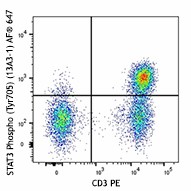
-

Human whole blood was stimulated with (top), or without (bottom) IL-6 for 15 minutes, and then treated with RBC Lysis/Fixation Solution (10X), permeabilized with True-Phos™ Perm Buffer, then stained with CD3 PE and STAT3 Phospho (Tyr705) (clone 13A3-1) Alexa Fluor® 647. -

| Cat # | Size | Price | Save |
|---|---|---|---|
| 651007 | 25 tests | ¥37,620 | |
| 651008 | 100 tests | ¥84,040 |
Tyrosine phosphorylation of STAT3 at Tyr705 occurs in response to LIF, IL-6, leptin, OSM, EGF, PDGF, and HGF. It plays a key role in cell growth and apoptosis through mediating expression of a variety of genes in response to the stimuli.
Product DetailsProduct Details
- Verified Reactivity
- Human, Mouse
- Antibody Type
- Monoclonal
- Host Species
- Mouse
- Immunogen
- KLH conjugated modified synthetic peptide
- Formulation
- Phosphate-buffered solution, pH 7.2, containing 0.09% sodium azide and BSA (origin USA)
- Preparation
- The antibody was purified by affinity chromatography and conjugated with Alexa Fluor® 647 under optimal conditions.
- Concentration
- Lot-specific (to obtain lot-specific concentration and expiration, please enter the lot number in our Certificate of Analysis online tool.)
- Storage & Handling
- The antibody solution should be stored undiluted between 2°C and 8°C, and protected from prolonged exposure to light. Do not freeze.
- Application
-
ICFC - Quality tested
- Recommended Usage
-
Each lot of this antibody is quality control tested by intracellular flow cytometry using our True-Phos™ Perm Buffer in Whole Blood Protocol. For flow cytometric staining, the suggested use of this reagent is 5 µl per million cells in 100 µl staining volume or 5 µl per 100 µl of whole blood.
* Alexa Fluor® 647 has a maximum emission of 668 nm when it is excited at 633 nm / 635 nm.
Alexa Fluor® and Pacific Blue™ are trademarks of Life Technologies Corporation.
View full statement regarding label licenses - Excitation Laser
-
Red Laser (633 nm)
- Application Notes
-
The STAT3 Phospho (Tyr705) antibody recognizes the regulatory tyrosine phosphorylation of human STAT3 protein and has been shown to be useful for Western blotting.
- Product Citations
-
- RRID
-
AB_2572085 (BioLegend Cat. No. 651007)
AB_2572085 (BioLegend Cat. No. 651008)
Antigen Details
- Structure
- STAT3 is a 770 amino acid protein of 88 kD. It consists of a DNA binding domain, a SH2 domain, a regulatory tyrosine responsible for binding of SH2 domain, and a C-terminal transactivation domain.
- Distribution
-
Ubiquitous.
- Function
- STAT3 is tyrosine phosphorylated by receptor kinases in response to a variety of cytokines and growth factors. It forms homo- or heterodimer with STAT1 when tyrosine is phosphorylated, and then translocates to nucleus, acting as a transcription regulator. It is also essential for the differentiation of TH17 cells, which is involved in autoimmune diseases.
- Cell Sources
- Cytoplasm. Translocate to nucleus in response to tyrosine phosphorylation.
- Cell Type
- Embryonic Stem Cells, Neural Stem Cells
- Biology Area
- Cell Biology, Neuroscience, Neuroscience Cell Markers, Signal Transduction, Stem Cells, Synaptic Biology, Transcription Factors
- Molecular Family
- Phospho-Proteins
- Antigen References
-
1. Akira S, et al. 1994. Cell 77:63.
2. Zhang X, et al. 1995. Science 267:1990.
3. Sanchez-Margalet V, et al. 2001. Cell. Immunol. 211:30.
4. Simon A, et al. 2000. Science 290:144.
5. Hoey T, et al. 1999. Adv. Immunol. 71:145. - Regulation
- The small GTPase Rac1 binds and regulates activity of STAT3.
- Gene ID
- 6774 View all products for this Gene ID
- Specificity (DOES NOT SHOW ON TDS):
- STAT3 Phospho Tyr705
- Specificity Alt (DOES NOT SHOW ON TDS):
- STAT3 Phospho (Tyr705)
- App Abbreviation (DOES NOT SHOW ON TDS):
- ICFC
- UniProt
- View information about STAT3 Phospho Tyr705 on UniProt.org
Related Pages & Pathways
Pages
Related FAQs
Other Formats
View All STAT3 Phospho (Tyr705) Reagents Request Custom Conjugation| Description | Clone | Applications |
|---|---|---|
| Purified anti-STAT3 Phospho (Tyr705) | 13A3-1 | WB,ICC,ChIP |
| PE anti-STAT3 Phospho (Tyr705) | 13A3-1 | ICFC |
| Alexa Fluor® 488 anti-STAT3 Phospho (Tyr705) | 13A3-1 | ICFC |
| Brilliant Violet 421™ anti-STAT3 Phospho (Tyr705) | 13A3-1 | ICFC |
| Alexa Fluor® 647 anti-STAT3 Phospho (Tyr705) | 13A3-1 | ICFC |
| Direct-Blot™ HRP anti-STAT3 Phospho (Tyr705) | 13A3-1 | WB |
| PE/Cyanine5 anti-STAT3 Phospho (Tyr705) | 13A3-1 | ICFC |
| FITC anti-STAT3 Phospho (Tyr705) | 13A3-1 | ICFC |
| PerCP/Cyanine5.5 anti-STAT3 Phospho (Tyr705) | 13A3-1 | ICFC |
Customers Also Purchased
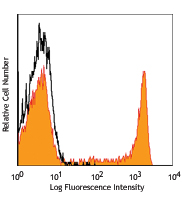
Compare Data Across All Formats
This data display is provided for general comparisons between formats.
Your actual data may vary due to variations in samples, target cells, instruments and their settings, staining conditions, and other factors.
If you need assistance with selecting the best format contact our expert technical support team.
-
Purified anti-STAT3 Phospho (Tyr705)
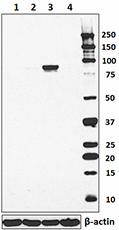
Total cell lysate from PC3 (lane 1, 15 µg), untreated HepG2 ... 
15 µg of total cell lysate from untreated NIH3T3 (lane 1) an... 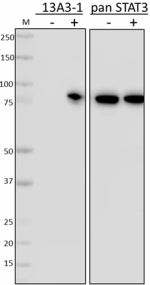
Total cell lysates (15 µg total protein) from A431 cells ser... 
Serum starved A431 cells were untreated (panel A) or stimula... 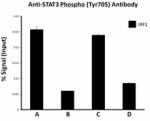
Chromatin Immunoprecipitation (ChIP) was performed using com... -
PE anti-STAT3 Phospho (Tyr705)
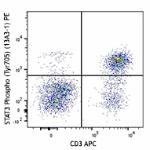
Human whole blood was stimulated with (top), or without (bot... 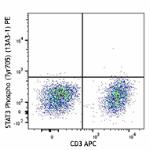
-
Alexa Fluor® 488 anti-STAT3 Phospho (Tyr705)
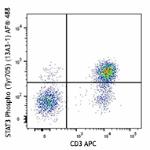
Human whole blood was stimulated with (top) or without (bott... 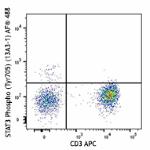
-
Brilliant Violet 421™ anti-STAT3 Phospho (Tyr705)
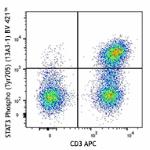
Human whole blood was stimulated with (top) or without (bott... 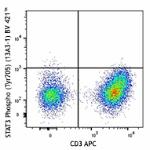
-
Alexa Fluor® 647 anti-STAT3 Phospho (Tyr705)
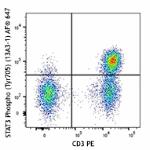
Human whole blood was stimulated with (top), or without (bot... 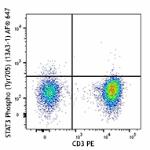
-
Direct-Blot™ HRP anti-STAT3 Phospho (Tyr705)
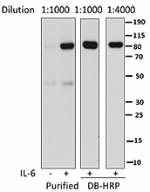
15 µg of total protein extract from HepG2 cells untreated o... -
PE/Cyanine5 anti-STAT3 Phospho (Tyr705)

Human whole blood was stimulated with (left), or without (ri... -
FITC anti-STAT3 Phospho (Tyr705)

Human whole blood was stimulated with (left) or without (rig... -
PerCP/Cyanine5.5 anti-STAT3 Phospho (Tyr705)

Human whole blood was stimulated with (left) or without (rig...










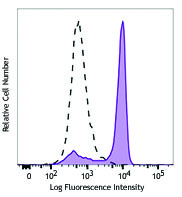
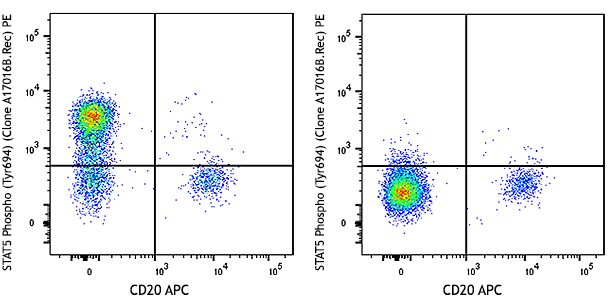
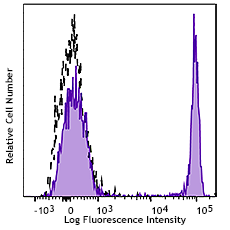



Follow Us